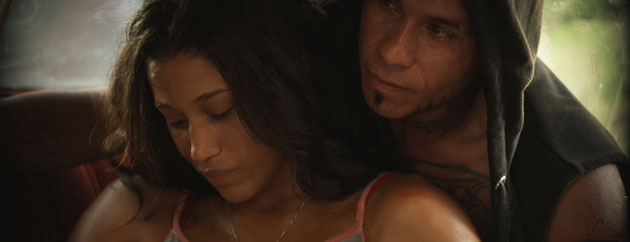
The Zero Hour
02 March, 2012Zero Hour is a Venezuelan thriller with the usual mix of gun-blazing between slum-hardened gangsters and over-zealous police, except with the interesting twist that it’s set during a 24 hour medical strike based on real events in Caracas in 1996.
This means that things are even more complicated than usual when Parca, after a voiceover in which he describes himself as the grim reaper, comes running back to his colleagues with a heavily pregnant and injured woman in his arms. We are quickly treated with motorbikes speeding through the narrowest parts of the barrios doing jumps and wheelies as they pull up to the nearest hospital, only to find it less than fully operational. The doctors are picketing against poor working conditions and the public are angry at them seemingly allowing people to die, spurred on by certain sections of the media and government who have little sympathy for the tough situations which the under-resourced medical staff regularly face.
Once inside, the gang kidnap a doctor, Cova (Erich Wildpret), who is on the fence about strike action, and who now has no choice but to go along with the gang to the nearest private hospital where they have better facilities. Getting there involves a huge car chase, a few dead policemen, lots of blood and a fresh and innocent new life born in the back of the speeding car. By now, the audience should’ve guessed that Parca, (played by Zapata 666, an underground hip hop star from Petare, Venezuela’s largest slum) is having something more than a standard moral awakening and has some vested interest in this woman, Lady Di, (as in the princess but pronounced Lay-dee-dee) in particular, and not just for maternity in general.
All of this action and plot thickening is almost enough for a whole film but, after half an hour of initial frenzy the main event is established: a hostage situation or siege, complete with world-weary negotiators and an eager media circus.
Things do continue to get darker and more complicated though as Parca becomes something of a social hero, agreeing to exchange hostages for the needy. Throughout, the film twists and turns in various interesting ways, with the baby’s paternity a huge contributing factor.
This is helped by the fact that, although none of the characters are probed in immense depth, there are enough decent and likeable ancillary characters that their involvement in the main parts of the intrigue does not feel too contrived. Some of the accomplice gangsters’ actions in the hospital even provide some genuine laughs as their juvenile and vulgar attitude to the situation comes out, especially towards Miss Venezuela, who had chosen the 24 hour medical strike as a good time to get some cosmetic surgery. One image-conscious gangster claims that he is more than a hard face and sings into his afro-comb to try and woo her — a cheeky nod to Zapata 666 and Seu Jorge perhaps?
Just when you think that the hospital situation is getting a little silly, one of Parca’s accomplices agrees that what ‘Saint Thug’ is doing is a little far-fetched:
“This ain’t a Hollywood movie, Parca.”
The irony of which is amplified when you consider the problems they undertook during shooting. Violence is such a problem in Caracas that during production, three crew members were kidnapped, the director, Diego Velasco, was held up at gunpoint and one of the actors was killed a week before he had a chance to perform his part. This film has broken all Venezuelan records and become the country’s biggest internal success story, which could be seen as strange since it glamorises some of the daily troubles which people face, but perhaps they are more understanding and trusting of the director because of his history in short film and documentary making which forced him to get his hands dirty investigating the hospital situations in particular.
Dr Cova’s motivations are especially confused, he claims to have treated a guy from the slums for gunshot wounds in his first week as a doctor, only to have him come back and rob him a few weeks later. Now, claims Parca, he lets gangsters bleed to death on the operating table. When asked by another doctor about his Hippocratic oath, Cova replies:
“Do you think Hippocrates knew what it was like to work in the slums?”
Not all doctors have to work in such difficult conditions as the impoverished areas of Caracas, but the film does show just how unsympathetic the media and government can be to striking professionals, when perhaps they don’t know the whole story of events on the ground. Perhaps it’s because the wealthy are happy being treated by private healthcare providers. Venezuela’s medical infrastructure is one of the more advanced in the region, and perhaps some of this film’s success could be credited to some kind of ‘public religion’ towards that service, in some ways similar to the situation over here.
The Zero Hour is showing as part of ¡Viva! festival 2012 at Cornerhouse, Machester. See cornerhouse.org/viva2011 for screenings.
Follow Sounds and Colours: Facebook / Twitter / Instagram / Mixcloud / Soundcloud / Bandcamp
Subscribe to the Sounds and Colours Newsletter for regular updates, news and competitions bringing the best of Latin American culture direct to your Inbox.

